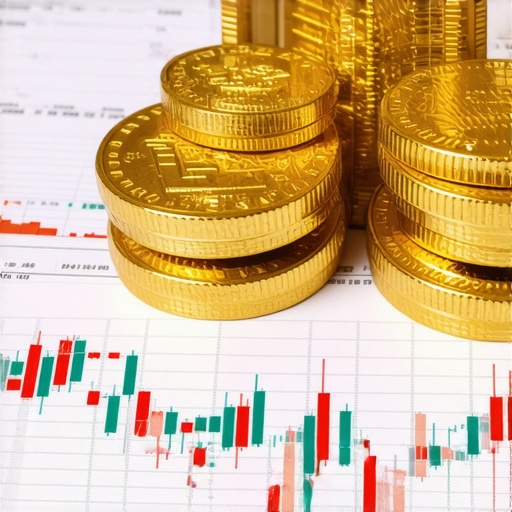Why Consider Gold ETFs for Your Investment Portfolio in 2025?
As we approach 2025, the financial landscape continues to evolve, making it crucial for investors to explore innovative investment options. One such option that has gained traction is Gold ETFs (Exchange-Traded Funds). These financial instruments allow individuals to invest in gold without the need to physically hold the asset. Here are the top five benefits of investing in gold ETFs that you should consider as you plan your investment strategies for the upcoming year.
What are the advantages of Gold ETFs?
1. Liquidity and Flexibility: Gold ETFs are traded on stock exchanges, which means they can be bought and sold like stocks. This provides investors with liquidity and flexibility, allowing them to quickly react to market changes. Unlike physical gold, which involves complexities in buying and selling, ETFs streamline the process.
2. Cost-Effective Investment: Investing in physical gold often incurs storage and insurance costs, which can eat into your profits. Gold ETFs reduce these overheads significantly, making them a more cost-effective alternative for gold investments. Additionally, they often have lower expense ratios compared to mutual funds.
3. Diversification: Gold ETFs allow investors to diversify their portfolios easily. By including gold in your investment mix, you can reduce overall portfolio volatility. This is particularly important in times of economic uncertainty, as gold typically acts as a safe haven asset.
4. Accessibility: With gold ETFs, you don’t need a large amount of capital to start investing. You can buy shares of an ETF for the price of one share, making gold investment accessible to a broader range of investors. This democratization of gold investment is a significant advantage.
5. Expert Management: Many gold ETFs are managed by financial experts who track market trends and performance. This expertise can help in making informed investment decisions, providing peace of mind for investors who may not have the time or knowledge to manage their investments actively.
In conclusion, investing in gold ETFs offers numerous benefits that can enhance your investment strategy in 2025. Whether you are looking for liquidity, cost-effectiveness, diversification, accessibility, or expert management, gold ETFs present a compelling case for consideration. For more detailed insights into gold investments, check out our comprehensive guide on Gold ETFs for Smart Investments. We invite you to share your thoughts on gold investments in the comments below! What are your plans for investing in gold this year?
How Gold ETFs Provide Protection Against Inflation
As inflation rates continue to rise, many investors are seeking ways to protect their wealth. Gold has historically been viewed as a strong hedge against inflation. By investing in Gold ETFs, investors can gain exposure to gold’s inflation-resistant qualities without the challenges of storing physical gold. In times of economic uncertainty, gold tends to hold its value, making it a smart addition to any investment strategy.
What Should Investors Know About Gold ETFs in 2025?
Gold ETFs offer a unique opportunity for investors looking to capitalize on gold’s potential benefits. With the ongoing fluctuations in the economy, understanding these financial products is critical. Here are some essential factors to consider:
1. Market Trends: Gold prices are influenced by various market factors, including supply and demand dynamics, geopolitical tensions, and currency fluctuations. Keeping an eye on these trends can help investors make more informed decisions about their gold ETF investments.
2. Regulatory Considerations: Understanding the regulatory environment surrounding gold ETFs is crucial for investors. Familiarizing yourself with tax implications and reporting requirements can help ensure a smooth investment process.
3. Performance Metrics: It’s essential to evaluate the performance of gold ETFs against traditional gold investments. By comparing historical returns and volatility, investors can assess the effectiveness of gold ETFs in their portfolios.
How Do Gold ETFs Compare to Physical Gold Investments?
Investors often wonder whether they should choose gold ETFs or physical gold investments. Both options have their advantages, but each serves different investment goals. Gold ETFs provide liquidity, lower storage costs, and ease of trading, while physical gold can offer tangible asset security.
In a detailed analysis by Wikipedia, it’s noted that Gold ETFs have gained popularity due to their accessibility and convenience. Understanding these differences is crucial for making informed investment decisions based on individual financial goals.
What Are the Risks Associated with Gold ETFs?
While Gold ETFs offer numerous benefits, they also come with certain risks. Investors should be aware of factors like market volatility, management fees, and the potential for tracking errors, which can affect the ETF’s performance compared to the underlying asset.
Additionally, geopolitical events and economic downturns can lead to sudden price fluctuations in gold, impacting ETF values. It’s essential to conduct thorough research and possibly consult with financial advisors to navigate these risks effectively.
For more insights into navigating the gold market, don’t miss our article on strategies for success. We encourage you to share your thoughts on gold ETFs and how they fit into your investment strategy in the comments below!
Understanding the Role of Gold in Investment Portfolios
Gold, often referred to as a safe-haven asset, plays a crucial role in diversifying investment portfolios. Its unique characteristics, including low correlation with other asset classes, make it an attractive option for investors seeking stability amidst market volatility. By incorporating Gold ETFs into your investment strategy, you can harness the benefits of gold while minimizing risks associated with direct investment in physical gold.
People Also Ask: How Do Gold ETFs Work?
Gold ETFs function by tracking the price of gold bullion, allowing investors to buy shares that represent a fraction of the gold held by the fund. This structure provides an easy way to invest in gold without the challenges of storage and insurance that come with physical gold. According to data from the Investopedia, these funds typically hold physical gold bars in secure vaults, ensuring that the value of the ETF shares reflects the current market price of gold.
Investors can buy and sell shares of Gold ETFs on stock exchanges, making it a highly liquid investment option. This accessibility allows you to react swiftly to market changes, a significant advantage over traditional gold investments.
Evaluating Gold ETF Performance
When considering Gold ETFs, it’s essential to evaluate their performance metrics. Look for factors such as historical returns, expense ratios, and tracking accuracy against the price of gold. A well-managed Gold ETF should closely mirror the price movements of gold, providing you with an effective hedge against inflation and economic downturns.
Furthermore, investors should keep an eye on the fund’s management style. Actively managed Gold ETFs may offer the potential for higher returns but often come with higher fees. In contrast, passively managed ETFs typically have lower expense ratios, making them an attractive choice for cost-conscious investors.
Why is Gold a Good Investment in 2025?
As we look towards 2025, the economic landscape suggests that gold will continue to be a strong investment choice. Factors such as geopolitical tensions, fluctuating currencies, and inflation rates are likely to drive demand for gold as a stable investment option. According to a report from the World Gold Council, global gold demand is expected to remain robust, further solidifying gold’s position as a vital component of diversified investment portfolios.
Additionally, gold’s historical performance during economic crises demonstrates its resilience as an asset class. With increasing market uncertainty, now is an optimal time to consider the benefits of incorporating Gold ETFs into your investment strategy.
In conclusion, investing in Gold ETFs offers numerous advantages, including liquidity, cost-effectiveness, and diversification. As you navigate your investment journey, take the time to analyze your options and consider how Gold ETFs can enhance your portfolio. We invite you to share your thoughts on gold investments in the comments below! What strategies are you considering for your investments in 2025?
Understanding the Benefits of Gold ETFs in a Volatile Market
As the market evolves, the importance of Gold ETFs becomes even more pronounced. These investment vehicles not only provide exposure to gold but also offer a hedge against market volatility. Investors looking for stability amidst economic fluctuations should consider the role that Gold ETFs can play in their portfolios. By investing in these funds, you can enhance your strategy while minimizing risks related to direct gold ownership.
How Do Gold ETFs Respond to Market Changes?
Gold ETFs are designed to track the price of gold, which means their value often rises during times of economic uncertainty. This characteristic makes them a popular choice for investors seeking refuge from market downturns. According to a report by the Bloomberg, gold has gained significant traction as a safe haven asset, especially in turbulent times. When the stock market dips, many investors flock to gold, causing its price to increase. This inverse relationship underscores the strategic importance of including Gold ETFs in your investment portfolio.
Exploring Tax Implications of Gold ETFs
Investors considering Gold ETFs should also be aware of the tax implications associated with these investments. Generally, profits from Gold ETFs are treated as collectibles, which can lead to higher capital gains taxes compared to stocks. Understanding the tax structure can help you optimize your returns and make informed decisions about your investments. Consulting with a tax professional can provide clarity on how to effectively manage your gold investments and maximize your benefits.
What Are the Environmental Considerations of Gold ETFs?
In recent years, environmental concerns have risen among investors, impacting how they view various asset classes, including gold. Gold mining can have significant ecological consequences, including habitat destruction and pollution. By opting for Gold ETFs, you can indirectly support sustainable investing practices. Many ETFs focus on responsibly sourced gold or collaborate with mining companies that adhere to strict environmental standards. Investing in these funds can align your financial goals with your values.
Strategies for Maximizing Returns with Gold ETFs
To make the most of your Gold ETF investments, consider employing various strategies. One effective approach is to dollar-cost average, where you invest a fixed amount regularly, regardless of gold prices. This method can mitigate the impact of market volatility and lead to a more favorable average cost per share over time. Additionally, keeping abreast of market trends and adjusting your portfolio accordingly can enhance your investment outcomes.
How Can You Stay Informed About Gold Market Trends?
Staying informed is crucial for successful investing in Gold ETFs. Regularly reviewing market reports, subscribing to financial newsletters, and following reputable industry analysts can help you keep track of trends and shifts in the gold market. Online resources such as the World Gold Council provide valuable insights on gold demand and supply, guiding your investment decisions.
In conclusion, Gold ETFs are becoming an essential component of modern investment strategies as we approach 2025. They offer numerous benefits, including liquidity, cost-effectiveness, and the ability to hedge against inflation and market volatility. As you explore these investment opportunities, remember to assess your individual goals and stay informed about market conditions. What strategies are you considering for your investments in gold this year? Share your thoughts in the comments below and join the conversation on the future of gold investments!
Frequently Asked Questions (FAQ)
1. What are Gold ETFs?
Gold ETFs, or Gold Exchange-Traded Funds, are investment funds that track the price of gold and trade on stock exchanges. Investors can buy shares of these funds, which represent a specific amount of gold, allowing them to gain exposure to gold prices without needing to own physical gold.
2. How do Gold ETFs work?
Gold ETFs work by holding physical gold bullion in secure vaults. The value of the ETF shares is directly linked to the price of gold, allowing investors to buy and sell shares on the stock market just like any other stock. This structure provides liquidity and ease of access to gold investments.
3. Are Gold ETFs a good investment in 2025?
Yes, Gold ETFs are considered a good investment in 2025 due to ongoing economic uncertainties, inflation concerns, and geopolitical tensions. These factors typically drive demand for gold, making it a reliable asset for diversification and protection against market volatility.
4. What are the tax implications of investing in Gold ETFs?
Profits from Gold ETFs are usually taxed as collectibles, which may incur higher capital gains taxes compared to regular stock investments. It’s crucial for investors to understand these tax implications and consult with a tax professional to optimize their returns.
5. How can I choose the right Gold ETF for my portfolio?
To choose the right Gold ETF, consider factors such as the fund’s expense ratio, historical performance, and tracking accuracy against gold prices. Additionally, evaluate whether the ETF is actively or passively managed based on your investment goals and risk tolerance.
6. What are the risks associated with Gold ETFs?
While Gold ETFs offer various benefits, they also come with risks, including market volatility, management fees, and potential tracking errors. Sudden economic changes or geopolitical events can impact gold prices, so investors should stay informed and conduct thorough research.
7. Can Gold ETFs be part of a retirement portfolio?
Yes, Gold ETFs can be an effective component of a retirement portfolio. They provide a hedge against inflation and market downturns, adding diversification. Many investors include Gold ETFs in their IRAs to secure their retirement savings against economic fluctuations.
8. How do Gold ETFs compare to mutual funds?
Gold ETFs differ from mutual funds in that they are traded like stocks on exchanges, providing greater liquidity and flexibility. Additionally, Gold ETFs typically have lower expense ratios compared to mutual funds, making them a cost-effective option for investors.
Authoritative Sources
World Gold Council: This organization provides in-depth research and insights about gold demand and supply dynamics, enhancing the understanding of gold’s role in investment strategies.
Investopedia: A reputable financial education website that offers a wealth of knowledge on investment products, including Gold ETFs, their workings, and their implications for investors.
Bloomberg: A leading global business and financial information news source that delivers timely updates on market trends, including those affecting gold prices and investments.
Conclusion
As we have explored, investing in Gold ETFs offers numerous advantages, including liquidity, cost-effectiveness, and a hedge against inflation and market volatility. In 2025, gold is poised to remain a strong investment option amidst ongoing economic challenges. By incorporating Gold ETFs into your investment strategy, you can enhance your portfolio’s resilience and capitalize on the security that gold provides. We encourage you to reflect on your investment strategies and consider how Gold ETFs could fit into your plans. Share your thoughts in the comments below, and let’s engage in a discussion about the future of gold investments! Don’t forget to check out our related articles to deepen your understanding of gold investing.









![3 Liquid Gold ETFs to Outperform Cash in Late 2026 [Tested]](https://buyingoldnow.com/wp-content/uploads/2026/01/3-Liquid-Gold-ETFs-to-Outperform-Cash-in-Late-2026-Tested.jpeg)
I’ve been considering diversifying my portfolio with gold ETFs recently, especially after reading about their liquidity and cost efficiency compared to physical gold. One aspect that really resonated with me is the accessibility factor—being able to invest small amounts rather than committing to large sums of physical gold is a game changer for individual investors like myself. Additionally, the environmental considerations mentioned gave me a new perspective; choosing ETFs that focus on responsibly sourced gold aligns well with my values. However, I also understand the importance of staying informed about market trends and regulatory implications as they can significantly impact performance. The tax nuances related to gold ETFs are crucial too. It sounds like they can be more complex than typical stock investments, so consulting with a tax professional before diving in seems wise. Is anyone else balancing the trade-off between active and passive ETF management for gold? It seems like active funds might promise better returns but also come with higher fees, which might not always justify the cost. Overall, gold ETFs seem like a practical option for 2025, especially given global uncertainties and inflation concerns, but thorough research definitely appears essential before investing.
I appreciate the detailed overview of Gold ETFs for 2025, especially the points about liquidity and cost-effectiveness. From my experience, one advantage that’s sometimes overlooked is how Gold ETFs integrate seamlessly with modern digital portfolios, making rebalancing much easier compared to holding physical gold. The mention of dollar-cost averaging stood out to me as it’s a strategy I’ve used to mitigate the volatility of gold prices over time. While gold has always been seen as a hedge against inflation, the article rightly highlights the importance of monitoring geopolitical tensions and currency fluctuations, which can momentarily disrupt gold markets. However, it’s also worth noting the potential tracking errors in ETFs versus owning physical gold — investors should weigh how closely the ETF aligns with actual gold prices. I found the environmental considerations particularly relevant today, since more investors are factoring sustainability into their choices. Choosing ETFs with responsibly sourced gold gives an ethical dimension to an already sound investment strategy. Overall, incorporating Gold ETFs in 2025 seems like a strategic move, especially for those looking to balance accessibility and portfolio diversification without the hassles of physical storage.